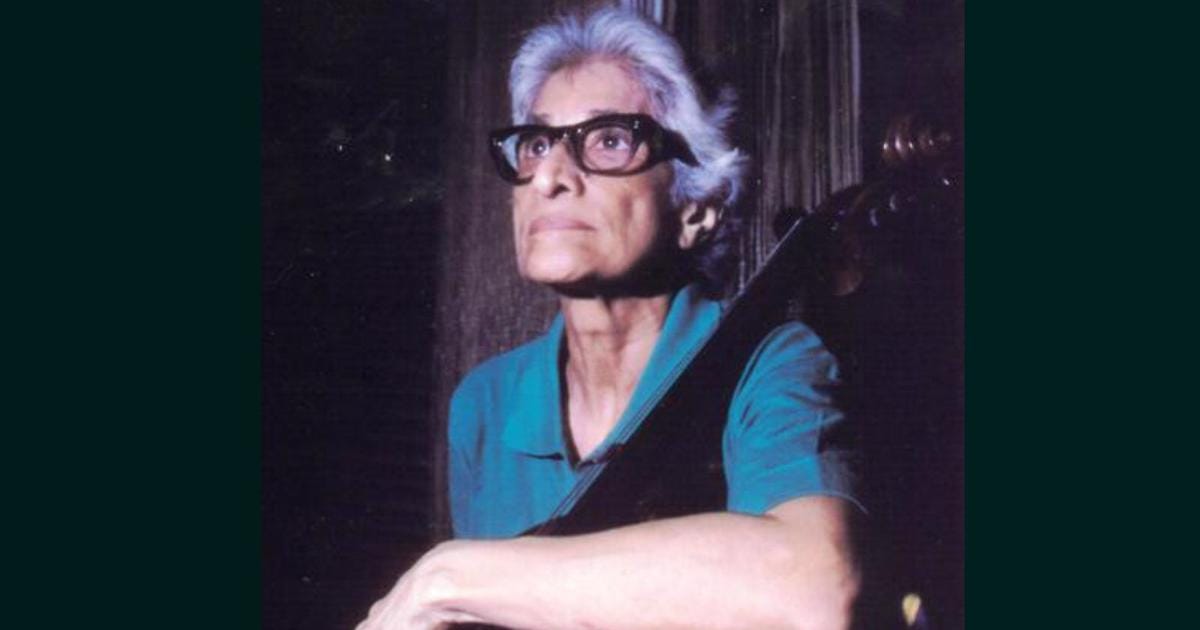Remembering Jini Dinshaw and Her Legacy with the Bombay Chamber Orchestra
Jini Dinshaw, founder of the Bombay Chamber Orchestra, shaped generations of Indian string players with her vision, energy, and devotion. Her passing marks the end of an era in India’s Western classical music history.

If I had to describe Jini Dinshaw in one word, ‘indefatigable’ would leap to mind. But maybe I am getting ahead of myself. For the benefit of Goan readers who haven’t heard of Jini (and I refer to her by her first name as this is how most of us knew and loved her): she was an absolute powerhouse. There isn’t yet a Wikipedia page about her but there ought to be.
She (along with our own Myra Shroff, then Menzies; and Siloo Panthaki) was among the top violin pedagogues in India’s musical capital then known as Bombay, now Mumbai. She spent 13 years in England learning “the art of the violin.” Many of the leading violinists and violin teachers in that city and beyond were taught by her.
Realising that there was a lacuna in the teaching and playing of the viola, Jini not only picked up the instrument herself but began teaching it as well.
She incredibly did this for cello too. It is very rare indeed for pedagogues of calibre to teach both the upper and lower stringed ‘family’ of instruments of the orchestra, but Jini Dinshaw did it. As I learned after reading all the tributes that have been flooding in the wake of her passing, Jini undertook a special trip to Switzerland in the 1970s just to learn how to teach the cello to her students back home.
In 1962, she founded the Bombay Chamber Orchestra (BCO), which is the longest active Western classical orchestra in India.
In 2016 she spoke to Nikhil Sardana, founder of Serenade, an online music magazine, about the rationale for forming the BCO: “On my return from the UK, I discovered that the Bombay Symphony Orchestra and the Bombay Philharmonia were no longer functioning. I was invited to an evening concert and was impressed by the performance level of the young students. Unfortunately, beyond the limited repertoire mainly based on examination works performed, the young talent did not possess knowledge of chamber music compositions and orchestral repertoire. This was due to the lack of schools of music in the city where students besides their instrumental coaching could receive chamber music and orchestral playing as their studies. The BCO was therefore founded to not only give the students the orchestral playing techniques, but to introduce them to the great symphonies and solo concert repertoire.”
I have written before about my idyllic “summer of ‘89”, the golden year in which I was a medical intern, and also benefited from the year-long visit of violin pedagogue and conductor George Trautwein and his wife, clarinetist and band teacher Barbara.
Trautwein conducted two BCO concerts that year, and I was part of the Goan contingent, about four or five of us. It was my first exposure to the BCO and the first time I met Jini. I learned so much orchestral repertoire and made lifelong friendships that have helped me so much. Some of the loveliest memories and experiences of my twenties are those BCO rehearsals (they began at 7 AM every day at the Max Mueller Bhavan, Fort, so Mumbai musicians could go to work or college afterward) and concerts. From 1989, I continued to play in the BCO when my medical career permitted, until I left for the UK in 1998. She by then was leading the violas, but so many in the string sections, particularly the cellos, were her students.
One of them is Bianca Mendonca, now General Manager of the Symphony Orchestra of India (SOI), India’s only professional symphony orchestra. Mendonca began Carl Orff lessons with Jini when very young and began cello lesson with her aged seven. “Miss Jini’s life was devoted to music — she accepted only a modest fee from her students. She gave me my first chance to play in an orchestral concert when I was just twelve, and I went on to perform there for seventeen years. The BCO laid the foundation for my orchestral experience. Without the cello and the BCO, I would not have the experience or career I have today,” she told me.
Marc Nunes, violist in the SOI from its inception and recently retired, is also thankful to Jini for introducing him to the instrument.
Concert pianist Karl Lutchmayer has performed with the BCO as soloist several times, conducted it once and even played third trumpet in its brass section quite recently. He told me, “[Jini Dinshaw’s] extraordinary energy and dogged determination have provided Mumbai with an orchestra through thick and thin, peopled it with generations of young musicians, and turned it into an ensemble that, year by year has been increasingly self-sufficient in its composition. She can truly be said to have exemplified the notion of 'being the change she wanted to see'.”
Anthony Gomes, founder of Furtados Music was Jini’s viola pupil and long-standing BCO member. “She transformed my life and so many more, bringing the joy of music learning to hundreds of youngsters, invigorating us with a passion to make music together. Her visionary zeal and selfless devotion to the cause of music made the BCO the thriving ensemble that is today such a source of pride for the music community of Mumbai. I was blessed to not only know her, but love her too,” Gomes wrote to me.
I can’t claim to have known her as well as Mumbai’s music community, but I cherish our long conversations as she drove me around town in her Maruti car, and a few visits to her apartment where I met her cat, aptly named Pizzi-cat-to.
In case readers are wondering what relevance the demise of the founder of an amateur orchestra in Mumbai has to us in Goa: there has been a steady stream of string players from Goa that has bolstered the rank and file of the BCO from its inception.
Winston Collaço, Goa’s foremost violin pedagogue, played in the BCO in the 1980s. He called Jini Dinshaw “a pillar, firebrand, a one-woman army” in the cause of music. He reminded me of the last time we both met her at the Midori concert at the Tata Theatre in Mumbai last year, still feisty as ever, telling us about the next BCO concert.
This very evening, the BCO will present ‘Strauss at 200’, “a double celebration to commemorate the 200th birth anniversary of Austrian Waltz King Johann Strauss II and the Austrian National Day 2025” in Mumbai, at which there will be a contribution from Goa, just as there was at my first exposure to the BCO in 1989. I caught the Kadamaba interstate bus, violin case perched on my lap for the 16-hour journey back then. Gen Z flies across instead.
Alisha Almeida, a teenage cellist from Margão, is elated at the prospect of performing in the BCO for the first time. In Mumbai for the last two weeks to rehearse with the orchestra, she regards this maiden experience as “a significant and exciting step into the music world” for her.
The BCO continues to be a major influence to young aspirant musicians from all over India. And it is all due to the visionary zeal of Jini Dinshaw.
This article first appeared in The Navhind Times, Goa, India.





